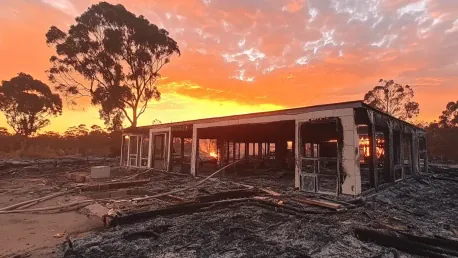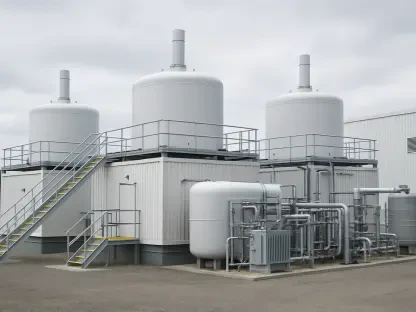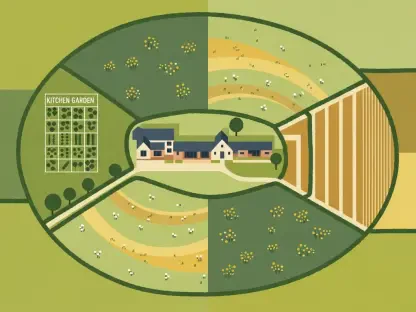The Canadian federal government has taken a significant step towards rebuilding the Village of Lytton, which was devastated by the fires of 2021. This initiative is part of a broader commitment to enhance community resilience in the face of climate change-induced disasters.
Federal Commitment to Rebuilding
Substantial Financial Investment
The federal government has allocated over $25.9 million for the construction of a new Community Hub in Lytton. This investment is complemented by an additional $407,649 from the Village of Lytton. The catastrophic fire that ravaged Lytton in 2021 obliterated 90 percent of the village’s structures, creating an urgent need for comprehensive rebuilding. By injecting substantial financial resources into the village’s reconstruction, the federal government demonstrates a commitment to support communities in times of unprecedented disaster. The proposed Community Hub is at the heart of this initiative, symbolizing hope and renewal for Lytton’s residents.
The significant investment underscores the importance of preparing Canadian towns for future climate change-related disasters, particularly those that can exacerbate wildfires. Under the looming specter of more frequent extreme weather events, the federal government’s financial contribution aims to rebuild public infrastructure with enhanced fire resilience. This not only restores the village’s physical landscape but also enhances its capacity to confront similar challenges in the future. Such strategic investments pave the way for a more secure and prepared community, ensuring that the vital lessons learned from the past contribute to a more stable future.
Broader Funding Strategy
The financial investment for Lytton’s new infrastructure is part of a grander $64 million commitment announced in June 2022. This comprehensive funding strategy aims to rebuild the village with fire-resistant and net-zero public buildings, constituting a significant shift towards sustainability and resilience. These investments mark a concerted effort to integrate advanced building practices that are rooted in eco-friendly and fire-retardant technologies. Utilizing these modern techniques substantiates the federal government’s endeavor to fortify public infrastructure against inevitable future adversities linked to climate change.
This larger funding framework not only focuses on immediate reconstruction efforts but also on the long-term well-being of the community. It introduces a broader paradigm of resilience, whereby public structures are designed to withstand environmental extremes. By prioritizing the integrity and sustainability of new buildings, this strategy ensures the durability and safety of community facilities, thereby playing a crucial role in the overarching objective of resilient community development. This approach sets a strong precedent for similar future investments, highlighting the necessity of forward-thinking policies in climate change adaptation strategies.
Features of the Community Hub
Multi-Functional Center
The Community Hub will feature a variety of amenities, including a community-sized pool that doubles as a fire reservoir, a museum, festival and market spaces, recreation areas, multi-purpose rooms, learning spaces, and accessible washrooms. This multi-functional center aims to cater to the diverse needs of the community, fostering an environment conducive to social interactivity and cultural expression. Incorporating such a wide range of facilities ensures that the Hub becomes a focal point of community life, offering residents ample opportunities for engagement and cohesion. The inclusion of multi-purpose rooms and learning spaces further emphasizes the Hub’s role in educational and recreational activities.
The design of the Community Hub is not only functional but also anticipates the varied and evolving needs of Lytton’s populace. The versatility of the spaces within the Hub allows for flexible usage, catering to events of various scales and purposes. From hosting cultural festivals to conducting community meetings and recreational activities, the Hub promotes a holistic approach to community development. As a venue that integrates spaces for learning, arts, and recreation, it helps create a sense of shared purpose and belonging among residents. This pivotal community asset aims to amplify civic pride and foster inclusive growth, thereby contributing to the overall vibrancy and resilience of Lytton.
Fire-Resilient and Sustainable Design
Located on Fraser Street, the new facility is designed to be fire-resilient and adhere to net-zero standards. This aligns with modern green building practices and climate change mitigation strategies. The fire-resilient architecture ensures that the Hub stands as a bastion of safety, capable of withstanding future fire incidents. Robust construction materials and fire-retardant technologies play crucial roles in achieving this level of resilience. Adhering to net-zero standards also highlights the Hub’s commitment to sustainability, minimizing carbon footprint, and promoting energy efficiency. This dual focus on resilience and sustainability exemplifies the comprehensive vision for future-proofing community infrastructure.
Incorporating sustainable design elements into the Community Hub is a testament to the practical application of green building principles. These practices not only reduce the environmental impact but also ensure a healthier indoor environment for users. From energy-efficient lighting to sustainable water management systems, every aspect of the Hub’s design is meticulously planned. This adherence to green practices contributes significantly to Lytton’s broader climate action goals. As more communities adopt similar strategies, the push towards building resilient, sustainable spaces becomes increasingly attainable, fostering an eco-friendly living environment and bolstering resilience against climate-induced adversities.
Importance of the Community Hub
Promoting Community Interaction
Upon completion, the Community Hub will serve as a vital gathering place, fostering community interactions and connections. It will support economic, social, and cultural activities, enhancing the overall quality of life for the residents of Lytton. The Hub is envisioned as more than just a physical structure; it is a cornerstone for rebuilding the social fabric of the community. By providing spaces where residents can congregate, share experiences, and engage in communal activities, the Hub fosters unity and collective growth. This enhancement of social cohesion is crucial for community recovery and resilience, promoting a shared sense of belonging and purpose.
The Community Hub’s role in promoting economic development cannot be understated. By offering spaces for markets and festivals, the Hub creates opportunities for local businesses and artisans to thrive, thereby stimulating the local economy. Cultural and recreational activities hosted at the Hub also attract visitors, further boosting economic activity. This symbiotic relationship between community engagement and economic vitality is essential for Lytton’s sustainable recovery. Through creating a lively and inclusive environment, the Hub acts as a catalyst for positive community dynamics, fostering a thriving and resilient social ecosystem.
Enhancing Community Resilience
The development of the Community Hub underscores the importance of resilience, emergency preparedness, and inclusivity. It aims to build back a stronger and more prepared community. By integrating fire-resistant features and emergency preparedness facilities, the Hub enhances Lytton’s ability to cope with future disasters. This proactive approach to resilience ensures that the community is not only rebuilding from past calamities but is also strategically preparing for future challenges. The Hub’s design and functionalities reflect a forward-thinking approach to community development, emphasizing the critical need for preparedness and adaptability in the face of climate change.
Inclusivity is a cornerstone of the Community Hub’s vision, ensuring that it serves diverse segments of the population, including vulnerable and marginalized groups. Accessible washrooms and adaptive learning spaces are just a few examples of how the Hub caters to the diverse needs of its users. This commitment to inclusivity enhances community resilience, ensuring that everyone, regardless of ability or background, can benefit from the Hub’s amenities. By fostering an inclusive environment, the Hub promotes social equity and reinforces the notion that resilience is a collective effort. This holistic approach to community development ensures that Lytton emerges from its rebuilding process as a stronger, more united, and better-prepared community.
Alignment with National Goals
Climate and Economic Objectives
The funding for the Community Hub aligns with Canada’s Strengthened Climate Plan: A Healthy Environment and a Healthy Economy. This plan focuses on reducing greenhouse gas emissions, enhancing energy efficiency, and bolstering climate resilience. By adhering to net-zero standards in its construction, the Hub supports the national objective of reducing carbon footprints and fostering sustainable development. This alignment with broader climate goals reflects the integrated approach of federal initiatives, ensuring that local projects contribute to overarching national priorities. These efforts underscore the significance of sustainable community planning in achieving long-term climate and environmental objectives.
Moreover, the Community Hub’s commitment to enhancing energy efficiency demonstrates a practical application of national policy frameworks. Utilizing green building technologies and energy-saving techniques reduces operational costs while also mitigating environmental impacts. This approach aligns with economic goals by promoting efficient resource use and minimizing waste, thereby contributing to a healthy economic landscape. As a model of sustainable infrastructure development, the Hub exemplifies the principles outlined in the national climate plan, serving as a replicable framework for future projects. Such local initiatives play a pivotal role in achieving comprehensive climate action and economic resilience at a national scale.
Inclusivity and Indigenous Engagement
The Green and Inclusive Community Buildings (GICB) program mandates that at least 10% of its funding is allocated to initiatives serving First Nations, Inuit, and Métis communities. This ensures inclusivity and supports Indigenous populations, particularly in urban settings. By embedding Indigenous engagement within the funding parameters, the program promotes equity and inclusion, ensuring that diverse voices and needs are addressed in community development. This commitment to inclusivity not only fulfills a moral and ethical responsibility but also enhances the effectiveness and resilience of community projects by incorporating diverse perspectives and solutions.
For the Community Hub in Lytton, this inclusive approach ensures that the needs of Indigenous residents are thoughtfully integrated into the design and functionality of the facility. By fostering collaborative relationships with Indigenous groups, the project benefits from rich cultural insights and traditional knowledge that can inform more effective and culturally relevant solutions. This enhances the Hub’s role as a truly inclusive space that reflects and respects the diversity of its community. Such initiatives also serve as models for other projects, illustrating the importance of inclusive and participatory planning processes in achieving equitable and resilient community development.
Conditional Funding and Stakeholder Involvement
Meeting Consultation Requirements
The disbursement of federal funds is contingent upon meeting all consultation requirements with Indigenous groups. This ensures that all stakeholders are adequately involved in the process. By adhering to thorough consultation protocols, the project promotes transparency and accountability, ensuring that the interests and concerns of Indigenous communities are meaningfully addressed. This collaborative approach fosters trust and cooperation among stakeholders, facilitating more effective and sustainable project outcomes. Consultation requirements also ensure that the development of the Community Hub aligns with broader principles of social justice and equity.
Engaging Indigenous communities through comprehensive consultations allows for the incorporation of traditional knowledge and practices that can enhance the resilience and cultural relevance of the Community Hub. This approach not only meets regulatory requirements but also strengthens the social fabric by fostering mutual respect and understanding among diverse community members. Ensuring that Indigenous voices are heard and valued in the development process enhances the inclusivity and acceptability of the project, contributing to its long-term success. Such participatory approaches are vital for achieving holistic and sustainable community development outcomes.
Formalization of Agreements
The Canadian federal government has made a noteworthy move towards rebuilding the Village of Lytton, which suffered immense damage due to the fires in 2021. This effort is part of a larger pledge aimed at bolstering community resilience against disasters driven by climate change. The initiative demonstrates the government’s dedication to not only reconstructing the affected village but also ensuring that communities are better prepared for future environmental challenges. By prioritizing the recovery of Lytton, the government is addressing both immediate and long-term needs, thereby fostering stronger, more resilient communities. This comprehensive approach goes beyond mere reconstruction; it embodies a resolve to protect and strengthen Canadian communities against the growing threats posed by climate change. By implementing such measures, the federal government underscores its commitment to sustainability and the well-being of its citizens, making sure that the unfortunate events faced by Lytton serve as a catalyst for positive change and preparedness across the nation.









